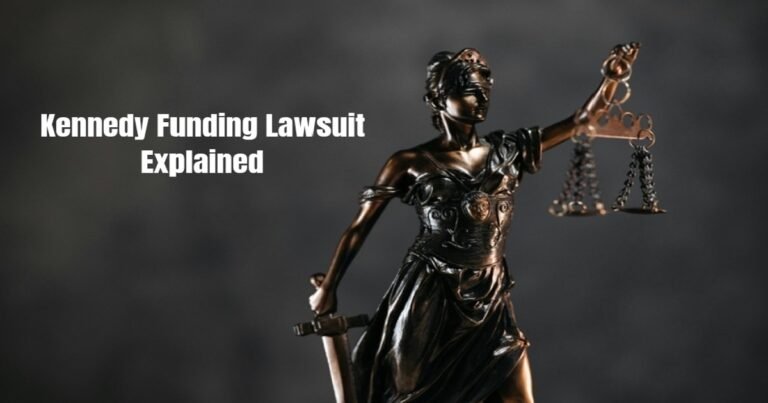The Kennedy Funding lawsuit has captured the attention of many in the commercial real estate industry, particularly those working with alternative financing options. If you’ve ever considered using non-traditional financing or just want to understand more about this legal case, you’re in the right place. This article will guide you through the lawsuit’s details, explore why it’s important, and discuss what the outcome might mean for the broader industry.
Background on Kennedy Funding

Who is Kennedy Funding?
Kennedy Funding is known in the commercial real estate sector for offering alternative, asset-based loans to companies that may struggle to secure traditional financing. Founded in the 1980s, the company’s flexibility in loan terms and its reputation for quick closings have helped it stand out. This approach appeals to borrowers who need financing for real estate projects but may not meet the standard lending criteria of banks or other financial institutions.
Why is Kennedy Funding Facing Legal Action?
Kennedy Funding’s business model is not without controversy. In this lawsuit, the company faces allegations that may range from misleading clients to failing to uphold terms of their agreements. Understanding these specifics helps set the stage for the legal challenges Kennedy Funding is encountering and why this case could set a significant precedent.
Overview of the Lawsuit

Key Details of the Kennedy Funding Lawsuit
The core of the Kennedy Funding lawsuit revolves around accusations from multiple plaintiffs who allege that Kennedy Funding engaged in practices that were either deceptive or harmful to the borrowers’ financial interests. The lawsuit is built around claims that Kennedy Funding failed to:
- Fulfill financial obligations as outlined in agreements.
- Maintain transparency in loan terms.
- Respect standard practices related to commercial real estate financing.
Each of these points provides insight into the potential areas where Kennedy Funding’s approach may have conflicted with client expectations or legal standards.
Timeline of Events
The legal dispute with Kennedy Funding started back in 2020 when several plaintiffs stepped forward with complaints against the company, raising various issues. Since then, the case has evolved, with key moments like initial rulings, appeals, and upcoming court dates shaping its path. By following this timeline, anyone interested can get a clearer picture of how the case is unfolding and its potential impact.
Implications of the Lawsuit
Impact on Kennedy Funding
If the lawsuit ends unfavorably for Kennedy Funding, it could face a range of consequences:
- Financial Settlements: They may be required to provide financial restitution or settlements to impacted clients.
- Reputational Impact: Lawsuits like these can damage a company’s reputation, potentially making clients hesitant to work with Kennedy Funding in the future.
- Operational Changes: The company might need to implement stricter practices to comply with legal standards, reshaping its operations.
Broader Industry Impact
This lawsuit highlights the fine line alternative lenders walk between providing flexible funding and adhering to fair lending practices. If the case sets a precedent, it could lead to stricter oversight of non-traditional lenders. Other companies might adopt more transparent processes and standardized terms to avoid similar legal complications.
Legal Themes and Financial Regulations
Lender Liability in Real Estate Law
The Kennedy Funding lawsuit underscores an important legal concept in commercial real estate: lender liability. In this case, lender liability implies that if Kennedy Funding didn’t adhere to fair lending practices, it could be held responsible for financial damages experienced by its borrowers.
For example, in cases where borrowers allege that a lender didn’t fully disclose terms, courts can decide that the lender is liable if they find the terms were indeed misleading or not legally binding.
Risk and Compliance for Financial Institutions
As this lawsuit illustrates, financial institutions working in non-traditional lending have an added responsibility to ensure that their terms are clear, fair, and compliant with industry regulations. Compliance teams in lending institutions may use this case as an example to assess and mitigate similar risks.
Expert Opinions and Industry Reactions
Insights from Legal Experts
Legal experts are paying close attention to the Kennedy Funding lawsuit, suggesting that its outcome could impact future lending practices. John Smith, a respected attorney in commercial finance law, commented, “This case might prompt lenders to rethink how they approach high-risk loans in real estate, encouraging more transparency and accountability.”
This sentiment is echoed by industry analysts, who believe this lawsuit could be a wake-up call for other lenders to revisit their compliance measures.
Industry Commentary
The lawsuit has not gone unnoticed in the real estate finance sector. Industry leaders are closely watching the proceedings, as an unfavorable outcome for Kennedy Funding may prompt new protocols or regulatory requirements for private lenders.
Potential Outcomes and Next Steps
Possible Resolutions for the Case
As with any legal case, there are a few possible ways this could end. Kennedy Funding might:
- Reach a settlement with plaintiffs, possibly without admitting wrongdoing but agreeing to compensate affected clients.
- Go to trial and either face or dismiss liability based on a judge or jury’s findings.
- Make operational adjustments proactively to mitigate damage to their reputation and satisfy regulatory scrutiny.
Future Implications
Regardless of the case’s outcome, it’s likely that Kennedy Funding and similar companies will take the opportunity to review and adjust their operational practices. Transparency, particularly around loan terms and borrower rights, could become a priority, leading to more stringent checks and balances within the industry.
Conclusion
The Kennedy Funding lawsuit is more than just a legal case; it’s a significant event that could shape the future of alternative lending in commercial real estate. The allegations against Kennedy Funding raise crucial questions about the responsibilities of lenders and the rights of borrowers.
As we watch this case unfold, it serves as a reminder of the importance of transparency and integrity in all financial dealings. Whether you’re an investor, a borrower, or just an interested observer, the Kennedy Funding lawsuit is a case worth following.
If you found this breakdown helpful, consider sharing it with others interested in real estate finance or similar cases.
